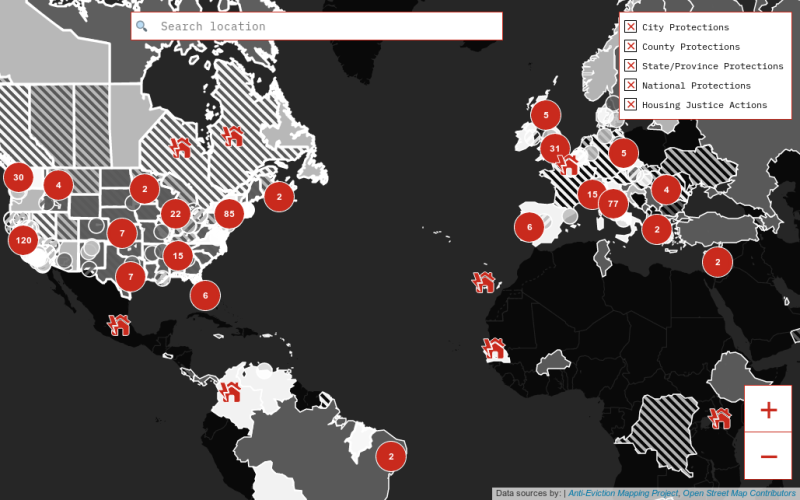The School of Data Science has responded to COVID-19 by engaging in a variety of research, including topics such as infectivity patterns, accessibility of healthcare information about COVID-19, effects of the pandemic on communities, and more. The School of Data Science is also engaging in housing crisis research, especially in regards to the effects of COVID-19 on tenant protections.
Despite the fact that protections against evictions have been temporarily put in place during COVID-19, evictions continue to occur. With the knowledge of this injustice, the Anti-Eviction Mapping Project (AEMP) has created the COVID-19 Housing Protection Legislation & Housing Justice Action Map.

AEMP is a collective of community organizers, researchers, and technologists who developed this interactive global map to track emergency responses — public policy changes as well as rent strikes and housing justice campaigns — arising around the world.
The map tracks policies that have expired or lapsed as state-of-emergencies are lifted, which generally correlates with increased evictions. It is color coded to show where there are many tenant protections, some tenant protections, few tenant protections, and missing data. It also shows where policies have expired, where evictions have occurred, and where housing justice actions are happening.
As stated on the AEMP site, “The Anti-Eviction Mapping Project aggregates data using free and open-source technologies to support social movements, community organizations, and research groups working toward housing justice” (Anti-Eviction Mapping Project).
The COVID-19 Housing Protection Legislation & Housing Justice Action Map is a collective effort supported by volunteers from various parts of the world who are contributing updates about tenant protections or housing justice actions in their region. Viewers can use one of two forms to either add information about a tenant protection policy in their respective city, county, or state, or about a housing justice action (i.e. rent strike) that they are a part of or has occurred where they live. In addition to the global map, there are local versions of the map currently running in Brazil, Rome, and the San Francisco Bay Area.
Luis Felipe R. Murillo, researcher and lecturer in the Center for Data Ethics and Justice, is part of the AEMP collective and has been working on the internationalization of the map, helping to write software for a more secure backend. With the help of several AEMP members, translators, and community organizers, he has worked to translate the map into various languages. Many other languages are being prepared by the European Action Coalition (such as Greek, Romanian, Hungarian, Serbo-Croatian and more).
Help spread the word about the map by following this link for the project!